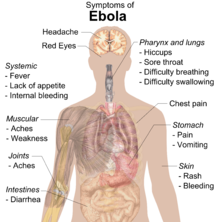The death toll from Ebola has risen to 2,296 with 200 of those people dying in a single day.
So far all attempts to control the outbreak have failed, and with each passing day the chances of this disease escaping Africa increases. The World Health Organisation is not at all optimistic in assessment of the situation, stating that they are expecting ‘thousands’ of new cases in the coming weeks. they also think that the numbers of deaths and infection are massively under-represented and that there are several thousand more infected people who cannot or will not seek treatment for the condition.
“We know that every day there are more people that need to be taken care of than we can include in our program. At the moment, there are insufficient beds,” MSF emergency coordinator Laurence Sailly told a news conference on Tuesday. Sailly said MSF was lobbying other non-governmental organizations and the United Nations to increase their response in the three countries, particularly in Liberia. “We are working also in Guinea and Sierra Leone, so we will not be able to have more than 300 to 400 beds here in Montserrado. (source)
As I have said numerous times it will only take one person walking amongst us for anything up to 21 days, the maximum incubation time, to start an outbreak in Europe, the UK or the United States. 21 days is considered the maximum incubation time for Ebola Zaire, the strain currently affecting West Africa. The mean incubation period is NINE days. Have a think, look at your diary. How many people do you come into contact with over a nine day period?
- Do you travel the country on business or for sport?
- Do you teach in a school, college or university?
- Do you attend a school, college or university as a student?
- Do you work in retail or the hotel industry?
- Do you work in a hospital? What if a visitor has the disease?
- Do you work at an airport or rail hub or even a bus station?
- Do you shop in large stores or have a coffee in town?
- Do you use public washrooms?
How on Earth could you name all your contacts? I could’t.
It’s impossible for members of the public to employ universal precautions at all times. Universal precautions are the basics of infection control that the medical profession use every day, on every patient in order to prevent the spread of infectious diseases. It works on the principle that ALL patients present a health hazard to medical staff and their families and thus the precautions taken are applied to everyone.
The reason so many medical staff have become sickened or died from Ebola is because those precautions do not extend far enough.
Ebola requires only that a bodily secretion from a sufferer makes it into your system. In addition to direct human contact Ebola can spread by contact with contaminated medical equipment, soiled bedding and towels, anything contaminated with bodily secretions. A book, a bag handle, a washroom tap or a door handle could pass the virus to you. Anywhere where sweat, blood, vomitus, faecal matter, urine or seamen is present presents a risk.
It’s hard to imagine that just shaking the sweaty hand of an infected person can present a health risk, but it can. EVERYONE needs to get into the habit now, whilst there is time to forget and make mistakes without it being the death of you, not touching their face with their hands. As an example, in any hospital in the western world you will see gloved medical staff rubbing their noses with their forearms to manage an itch, they don’t do this for fun, it’s done to prevent the transfer of contaminants to their face.
You will also see them wearing a variety of occlusive dressings to cover cuts and grazes that may be a source of entry for infections. This needs to become standard practice for EVERYONE that wishes to avoid not only the ravages of Ebola, but other infections that can gain entry to the body via an unprotected cut.
Handwashing needs to be declared a national pastime, far too many infections are spread though poor hand hygiene. Hands should be washed throughly, including the webbing between the fingers, on a regular basis.
The easiest way to do this is to wash your hands normally and then put your palm on the back of the opposite hand and interlace the fingers, this removes germs lurking between the fingers. Repeat with the other hand.
Casual sex needs to become a thing of the past…unlikely to happen, but with each casual encounter giving rise to the possibility of your life ending in a very painful and undignified way, such couplings need to be considered carefully. In situations where a kiss could be a death sentence, curbing promiscuity certainly has a place in infection control.
We are approaching a tipping point with Ebola. Either the epidemic currently sweeping West Africa will be brought under control in short order…or it’s going to get out to the wider world.
Not everyone can afford to acquire full biohazard suits and the equipment to go with it. Judging from the increasing number of health workers falling prey to the disease even having all the right gear does not afford complete protection…unless these people are contracting Ebola in the community when they are not working.
As I have said on numerous occasions about a variety of conditions:
“If it can’t get inside you, you can’t catch it.”
Take Care
Liz

